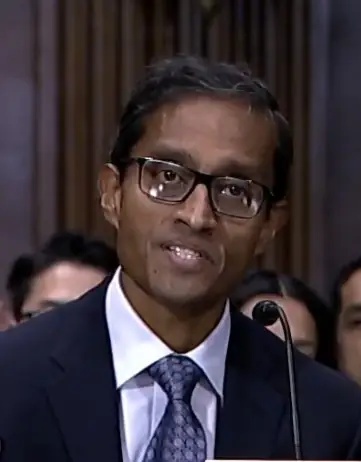Photo: Arun Subramanian, United States District Judge for the Southern District of New York; via Wikipedia.
As Robyn Autry, Professor of Sociology and Director of the Center for the Study of Public Life at Wesleyan University, explained for MSNBC, Sean “Diddy” Combs wrote a four-page letter to the court on Thursday, just one day before his sentencing. On Friday, U.S. District Judge Arun Subramanian sentenced the disgraced music mogul to 50 months in prison, five years of supervised release, and a $500,000 fine. In his letter, Combs expressed remorse for the domestic violence he inflicted on his former partner, Cassandra “Cassie” Ventura, writing, “My domestic violence will always be a heavy burden that I will have to forever carry.”
Though he stated he could never forgive someone “if they put their hands on one of my daughters,” he still asked the judge for mercy, citing his 84-year-old mother’s recent brain surgery and his responsibility to care for his two-year-old daughter.
Combs was found guilty of two counts of transporting women—Ventura and another woman referred to as “Jane”—to engage in prostitution. He was acquitted of two more serious charges: racketeering conspiracy and sex trafficking. In his letter, Combs said he had “lost his way” and “literally lost [his] mind,” attributing his behavior to selfishness and substance abuse.
During Friday’s sentencing, Combs wept and pleaded for leniency, promising never to be violent again. But Judge Subramanian was unmoved. He praised the bravery of the women who testified, saying, “Jane and Cassie Ventura have been through abuse and trauma we couldn’t imagine. You weren’t just talking to the jury, you were talking to the women who feel powerless.”
Prosecutors had asked for more than 11 years, while Combs sought a sentence of 14 months—time served.
While Combs’ apology letter acknowledged some blame, it centered on his pain and redemption, not his victims’ suffering, Autry said. He portrayed himself as a fallen figure seeking forgiveness, overshadowing the trauma his victims continue to endure. In her letter to the court, Ventura wrote, “Reliving in detail the events and truths described throughout the trial and this letter causes me tremendous emotional pain. I am trying with all that I am, to move on.”
After sentencing, Ventura’s attorneys released a statement: “While nothing can undo the trauma caused by Combs, the sentence imposed today recognizes the impact of the serious offenses he committed. We are confident that with the support of her family and friends, Ms. Ventura will continue healing, knowing that her bravery and fortitude have been an inspiration to so many.”
Ventura began dating Combs at age 19, when he was 36. In 2023, she filed a civil lawsuit accusing him of sexual assault, trafficking, and abuse, settled just a day after filing.
Throughout the trial, social media was rife with hostility toward the women who testified. Some dismissed them as liars or opportunists. As sociologist Nicole Bedera noted, “We’re in a new era where instead of people trying to convince us not to believe survivors, they tell us the survivors deserved it.”
When the verdicts were announced, some outside the courthouse laughed and mocked the proceedings—many even reenacting Combs’ notorious “freak off” parties, which prosecutors said involved coercive acts. Rival rapper 50 Cent later posted a parody letter to the judge, further trivializing the case.
Judge Subramanian made it clear that Combs’ history of violence could not be erased by remorse. “You abused the power and control with women you professed to love,” he told him. “You abused them physically, emotionally and psychologically.”
The now-infamous hotel security footage showing Combs dragging Ventura across the floor—released by CNN in May 2024—serves as a haunting reminder of the abuse she endured. For many, that video remains the most indelible image of his crimes, Autry writes.
While Combs claimed that prison had changed him, prosecutors argued otherwise, revealing that he had already booked Miami events for the week following sentencing, evidence, they said, of his arrogance.
Combs’ sentencing should prompt reflection not only on his actions but on how society responds to survivors. As Autry writes, “We may debate whether the judge was too harsh or too lenient, but what matters most is that we begin to take seriously the voices and suffering of survivors.”
While the Combs case may not fall under institutional sexual abuse, it underscores the same systemic patterns of power, silence, and survivor retraumatization seen across many institutions. SurvivorsRights.com may help connect survivors of institutional sexual abuse with resources and legal assistance to begin their path toward justice and healing.




